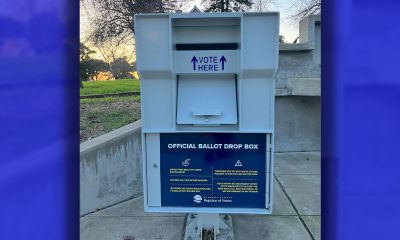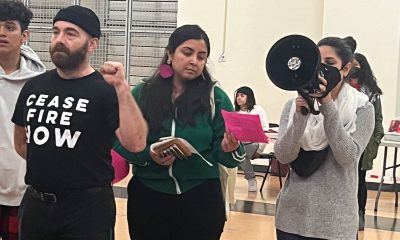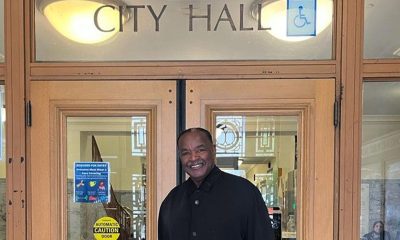Activism
Community and Developers Ask: Why Is There so Little Money in the City’s Affordable Housing Fund?

Where have the city’s funds for affordable housing gone?
That’s a question City Council President Rebecca Kaplan and council members want to answer as they look at why there is so little money in the city’s affordable housing trust fund at a time when booming high end construction in Oakland should be generating many millions of dollars in “impact fees” that housing developers are required to pay to avoid building a certain percentage of affordable units on a project.
Since 2016 when impact fees went into effect, the fund has only collected $8.8 million, according to a city report. Of this money, the city has committed $4.9 million to three affordable housing developments, totaling 162 units that not yet completed.
However, the city since 2016 has issued about 10,000 building permits that are moving ahead and are expected to build more than 17,000 new units by 2024, which means that city officials could have collected an estimated $25 million in impact fees in the past four years and, as much as $50 million as the projects move toward completion.
Impact fees can cost developers between $5,000 to $24,000 for each market rate unit they build, depending on the location of the project and when the permits were issued.
In response to questions raised by Council members Kaplan, Nikki Fortunato-Bas and others, the city administration has hired an independent analyst to audit the fund and improve procedures for collecting the money.
“These are steps in the right direction, but if we are to truly meet our goal of 4,760 affordable homes by 2024 (we are at 751), we must most aggressively enact policies and procedures that accelerate affordable housing creation and funding,” said Kaplan in a letter to the council and the public.
Speaking at Wednesday evenings council meeting, Assistant City Administrator Marasheshia Smith said the full report on impact fees would be available in the spring.
“We don’t think there are missing funds,” she said, pointing out that her department is short staffed and that most of current staff members, including herself, are new. “We are trying to understand what processes were put in place to account for the funds…We would like an audit because we’d like to see some process improvement.”
Jeffrey Levin of East Bay Housing Organizations (EBHO), speaking at last week’s Community and Economic Development (CED) Committee meeting, said impact fees were supposed to be a way for the city to get private developers to help pay for affordable housing.
“It is shameful that the city cannot explain how it is in an unprecedented building boom (that) we have so little money to show for it,” Levin said. “Something is just not adding up, We don’t know what’s wrong, but nobody can explain it either, and we wait and we wait, and that waiting is not without consequence.”
“We raised this issue in January, we raised it again in May, (and) we were assured that in a couple of months an accounting would be done … Now we’re being told it will be March, April or April or May (2020) before we can see the numbers. That is just not good enough…There is no accountability and no transparency,” said Levin.
Representing developers, Greg McConnell of the Oakland Jobs and Housing Coalition said that affordable housing advocates are not the only ones who want to know what has happened to the funds.
“Developers are pretty interested in this too,” he said.
McConnell added that developers served on the Mayor’s Housing Cabinet, served on commissions and boards and helped develop the impact fee ordinance. “Little did we know it would be years down the road trying to figure where the money went. It’s a cause of great concern,” he said. “(Developers) who helped put all these cranes up that you see they have put money into the city, and the money hasn’t been spent, and the housing crisis goes unabated.”
Stevi Dawson of EBHO thanked Council President Kaplan for pushing the city to produce a report on the fees. “If she hadn’t intervened, we’d still be asking for this staff report. We need more transparency. We do not need to spend a year and a half asking for something that should be published (every year). There should be a yearly accounting.”
Activism
Oakland Post: Week of April 24 – 30, 2024
The printed Weekly Edition of the Oakland Post: Week of April 24 – 30, 2024

To enlarge your view of this issue, use the slider, magnifying glass icon or full page icon in the lower right corner of the browser window. ![]()
Activism
Oakland Post: Week of April 17 – 23, 2024
The printed Weekly Edition of the Oakland Post: Week of April 17 – 23, 2024

To enlarge your view of this issue, use the slider, magnifying glass icon or full page icon in the lower right corner of the browser window. ![]()
Activism
Oakland Schools Honor Fred Korematsu Day of Civil Liberties
Every Jan. 30, OUSD commemorates the legacy of Fred Korematsu, an Oakland native, a Castlemont High School graduate, and a national symbol of resistance, resilience, and justice. His defiant stand against racial injustice and his unwavering commitment to civil rights continue to inspire the local community and the nation. Tuesday was “Fred Korematsu Day of Civil Liberties and the Constitution” in the state of California and a growing number of states across the country.

By Post Staff
Every Jan. 30, OUSD commemorates the legacy of Fred Korematsu, an Oakland native, a Castlemont High School graduate, and a national symbol of resistance, resilience, and justice.
His defiant stand against racial injustice and his unwavering commitment to civil rights continue to inspire the local community and the nation. Tuesday was “Fred Korematsu Day of Civil Liberties and the Constitution” in the state of California and a growing number of states across the country.
One OUSD school is named in his honor: Fred T. Korematsu Discovery Academy (KDA) elementary in East Oakland.
Several years ago, founding KDA Principal Charles Wilson, in a video interview with anti-hate organization “Not In Our Town,” said, “We chose the name Fred Korematsu because we really felt like the attributes that he showed in his work are things that the children need to learn … that common people can stand up and make differences in a large number of people’s lives.”
Fred Korematsu was born in Oakland on Jan. 30, 1919. His parents ran a floral nursery business, and his upbringing in Oakland shaped his worldview. His belief in the importance of standing up for your rights and the rights of others, regardless of race or background, was the foundation for his activism against racial prejudice and for the rights of Japanese Americans during World War II.
At the start of the war, Korematsu was turned away from enlisting in the National Guard and the Coast Guard because of his race. He trained as a welder, working at the docks in Oakland, but was fired after the bombing of Pearl Harbor in 1941. Fear and prejudice led to federal Executive Order 9066, which forced more than 120,000 Japanese Americans out of their homes and neighborhoods and into remote internment camps.
The 23-year-old Korematsu resisted the order. He underwent cosmetic surgery and assumed a false identity, choosing freedom over unjust imprisonment. His later arrest and conviction sparked a legal battle that would challenge the foundation of civil liberties in America.
Korematsu’s fight culminated in the Supreme Court’s initial ruling against him in 1944. He spent years in a Utah internment camp with his family, followed by time living in Salt Lake City where he was dogged by racism.
In 1976, President Gerald Ford overturned Executive Order 9066. Seven years later, the 9th Circuit Court of Appeals in San Francisco vacated Korematsu’s conviction. He said in court, “I would like to see the government admit that they were wrong and do something about it so this will never happen again to any American citizen of any race, creed, or color.”
Korematsu’s dedication and determination established him as a national icon of civil rights and social justice. He advocated for justice with Rosa Parks. In 1998, President Bill Clinton gave him the Presidential Medal of Freedom saying, “In the long history of our country’s constant search for justice, some names of ordinary citizens stand for millions of souls … To that distinguished list, today we add the name of Fred Korematsu.”
After Sept. 11, 2001, Korematsu spoke out against hatred and discrimination, saying what happened to Japanese Americans should not happen to people of Middle Eastern descent.
Korematsu’s roots in Oakland and his education in OUSD are a source of great pride for the city, according to the school district. His most famous quote, which is on the Korematsu elementary school mural, is as relevant now as ever, “If you have the feeling that something is wrong, don’t be afraid to speak up.”
-

 Activism4 weeks ago
Activism4 weeks agoOakland Post: Week of March 27 – April 2, 2024
-

 #NNPA BlackPress4 weeks ago
#NNPA BlackPress4 weeks agoCOMMENTARY: D.C. Crime Bill Fails to Address Root Causes of Violence and Incarceration
-

 #NNPA BlackPress4 weeks ago
#NNPA BlackPress4 weeks agoMayor, City Council President React to May 31 Closing of Birmingham-Southern College
-

 #NNPA BlackPress4 weeks ago
#NNPA BlackPress4 weeks agoBeloved Actor and Activist Louis Cameron Gossett Jr. Dies at 87
-

 Community1 week ago
Community1 week agoFinancial Assistance Bill for Descendants of Enslaved Persons to Help Them Purchase, Own, or Maintain a Home
-

 Activism3 weeks ago
Activism3 weeks agoOakland Post: Week of April 3 – 6, 2024
-

 Business1 week ago
Business1 week agoV.P. Kamala Harris: Americans With Criminal Records Will Soon Be Eligible for SBA Loans
-

 Activism2 weeks ago
Activism2 weeks agoOakland Post: Week of April 10 – 16, 2024























































